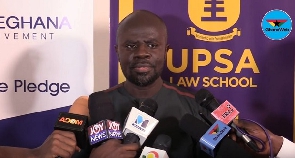 UPSA Dean of Law School, Professor Ernest Kofi Abotsi
UPSA Dean of Law School, Professor Ernest Kofi Abotsi
The Dean of Law School at the University of Professional Studies, Accra (UPSA), Professor Ernest Kofi Abotsi has emphasised the need for a wide and long-term bipartisan economic policy blueprint – based on the country’s constitution to address its numerous economic challenges.
This, he said, will ensure that the country is not governed based on what he termed as “acyclical partisan policies” that are thrown to the winds when there is a change of government.
“Broad policy blueprints have apparently been missing in our national economic policy dialogue. I think we need long-term economic policies – policies that are bi-partisan and bought into by all political parties so we do not have strictly partisan policies. The partisan policies tend to be acyclical – so any time government changes, then they are discarded.
“We need to have policies that transcend governments – and the way to do that is having a national economic blueprint for policy direction. Our constitution itself has provided an index – so all that’s required of us is to take its economic blueprint and build upon it to achieve economic transformation. The blueprint’s detailed aspects can be the basis of differentials between the parties – where they differ on questions of the details,” he elaborated.
Additionally, with regard to the upcoming Ghana Economic Forum (GEF) 2024, he expects fresh conversation on the national economy’s current state as well as a fresh perspective on its economic model. “What we have to answer is ‘what the framework of our economic model is, how it relates to the external environment and whether the model we have adopted since 1992 is ideal; and if not, what model works best’?
“I am also expecting a number of things from the standpoint of employment and inflation, as well as the real impact of economic policies on people,” he further noted.
Moreover, on the economy’s current state, he bemoaned the steep currency depreciation, inflation and the unemployment situation. “Also, our Balance of Payments Deficit has gone into positive – giving an impression that it has improved, but it has only been marginal.”
Kofi Abotsi said this in a pre-Ghana Economic Forum (GEF) 2024 interview with Business and Financial Times (BFT) on August 6, 2024 in Accra.
The GEF is an annual event aimed at fostering dialogue among key stakeholders on critical economic issues facing the nation. This year’s forum is particularly significant as it features keynote addresses and interviews with two presidential candidates, reflecting the intersection of economic policy and upcoming elections. Additionally, it provides a platform for policymakers, business leaders, economists and academics to share insights, debate policy directions and explore innovative solutions to drive Ghana’s economic growth and development.
The epic event will also witness Vice President Dr. Mahamudu Bawumia delivering an opening address – focusing on current state of the country’s economy, key achievements and future economic strategies. This speech will set the tone for the forum, highlighting critical issues such as macroeconomic stability, investment climate and economic diversification.
Furthermore, the event – happening on August, 8, 2024 – is on the theme ‘Re-engineering Ghana’s Economic Model for Sustainable Development: A Robust Financial Sector, Political Leadership and National Development Plan is Key’.
It will empanel leading economists, policymakers, and business leaders, to provide a comprehensive overview of the country’s economic landscape on topics such as fiscal policy, monetary policy, trade, investment and many others.
GEF 2024 promises to be a pivotal event, bringing together diverse voices to address the nation’s economic challenges and opportunities. By featuring high-profile political figures and expert panels, the forum aims to influence policy and foster a collaborative approach to economic development.
The insights and recommendations generated from this forum will be crucial in shaping Ghana’s economic policy landscape during the coming years.